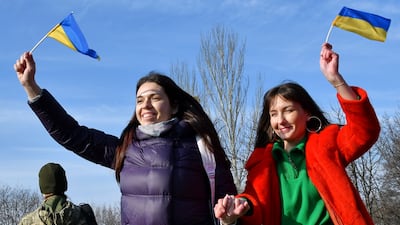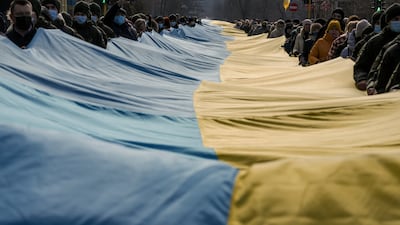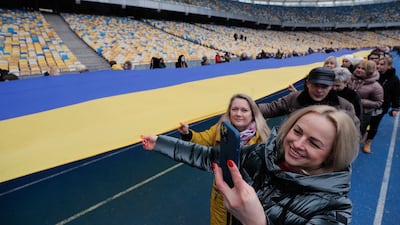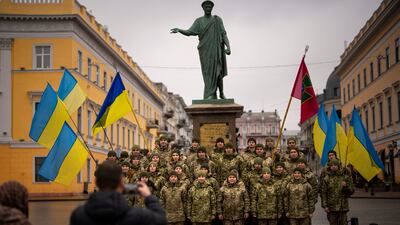Senior figures in Nato have demanded a wider Russian troop withdrawal from near Ukraine, as a second day of purported pullbacks failed to convince the West that the crisis was easing.
Russia announced that a column of military vehicles was leaving a training ground in annexed Crimea and returning to the mainland on Wednesday, a day after it said some troops were returning to their barracks after completing drills near Ukraine.
But Nato remained on high alert as defence ministers from the alliance’s 30 member countries held talks in Brussels, with Ukraine attending as a guest as the question of its future membership hangs over the crisis.
Jens Stoltenberg, the Nato Secretary General, said footage of tanks being loaded into railway cars was not proof of de-escalation and that the overall picture still showed Russia increasing the number of soldiers near Ukraine.
“If they really start to withdraw forces, that’s something we will welcome,” he said. “They have always moved forces back and forth, so just that we see movement of forces or battle tanks doesn’t confirm a real withdrawal.”
The defence ministers' talks ended with an appeal to Russia "in the strongest possible terms" to call off its troop movements, and an offer of further talks in the Nato-Russia council after a previous summit in that format ended with no clear breakthrough.
Nato is considering establishing new battle groups in central, eastern and south-eastern Europe in response to Russia’s actions.
Mr Stoltenberg insisted the alliance’s actions were defensive and “Nato is not a threat to Russia”.
But he said the stance adopted by the Kremlin was the sign of a “new normal” in Europe.
“We do not know what will happen in Ukraine, but the situation has already demonstrated that we face a crisis in European security,” he said.
“Moscow has made it clear that it is prepared to contest the fundamental principles that have underpinned our security for decades, and to do so by using force.
“I regret to say that this is the new normal in Europe.
“Therefore today ministers decided to develop options to further strengthen Nato’s deterrence and defence, including to establish new Nato battle groups in central and eastern and south-eastern Europe.”
Germany signalled it would not treat the scheduled departure of troops after completed military drills as a sign of Moscow lowering its posture.
Russia is still conducting drills on the territory of its ally Belarus and in the Mediterranean Sea, with the naval exercises prompting a warning from shipping insurers about risks to merchant vessels.

Belarus said on Wednesday that not a single soldier from Russia would stay within its borders after the drills were complete.
But for Nato it is “important that we have a sustained de-escalation, that it’s not just about withdrawing troops that were going to be withdrawn anyway”, said German Defence Minister Christine Lambrecht.
“We will be watching these signs closely,” she said. “Who is being withdrawn, for what reason, was it planned anyway, how serious and how sustainable are these signals?”
Britain's Defence Minister Ben Wallace said the Russians did not appear to have "taken the foot off the gas" in their military preparations.
There was widespread speculation that Wednesday could be when Russia launched an invasion but the day instead dawned with Ukrainians flying their flag outside schools, shops and hospitals in a show of defiance.
Ukraine’s ambassador to the UK said the so-called unity day was meant to show that the country was not intimidated by the Russian troop build-up, estimated by Nato and the US at between 100,000 and 150,000 soldiers.
“We understand that actually war is not imminent,” Vadym Prystaiko told Sky News, as Ukrainian diplomats again played down statements by the US and UK that an invasion could come any day.
US President Joe Biden said an invasion was still possible as he told Russia that sanctions in the event of war would go further than those imposed after Crimea was annexed in 2014.
Russia, in turn, says it would retaliate with counter-sanctions and is refusing to drop demands that Ukraine should be barred from joining Nato.
Western powers refuse to make such a guarantee, while Russian President Vladimir Putin said he would not accept vague assurances that a Ukrainian accession is not imminent.
But Nato said there was a potential diplomatic opening after Russia and Germany expressed a willingness to discuss other issues such as missile control.
Russia also indicated it was in no rush to formally recognise self-declared breakaway republics in eastern Ukraine, after Mr Putin was urged to do this by a vote of the country’s parliament on Tuesday.
Such a move would not correspond to the Minsk peace agreements aimed at ending the long-running war, said Kremlin spokesman Dmitry Peskov. Moscow and Kiev blame each other for failing to abide by these accords.
US Secretary of State Antony Blinken said recognising Donetsk and Luhansk would would further undermine Ukraine’s sovereignty and territorial integrity.
It would "constitute a gross violation of international law, call into further question Russia’s stated commitment to continue to engage in diplomacy to achieve a peaceful resolution of this crisis, and necessitate a swift and firm response from the United States in full co-ordination with our Allies and partners," Mr Blinken said in a statement.
Ukraine and its western allies say Russia helps the separatists with its own ground forces, an accusation Moscow denies.

















